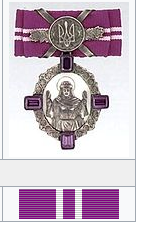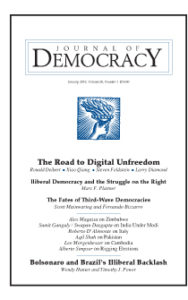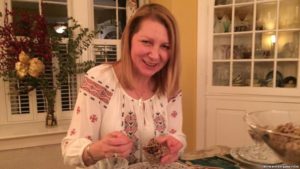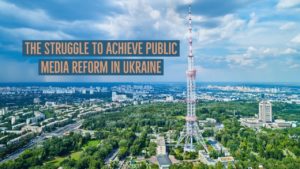Nadia Diuk (above, center) was by all accounts an extraordinary woman who leaves fond memories for her loved ones as well as a legacy of admirable work throughout which she displayed tireless devotion to Ukraine, Gabriel Hardy-Françon writes for the Kyiv Post:
Diuk died at age 64 on Jan. 23, in her Washington, D.C., home, surrounded by family and friends, after a years-long fight against breast cancer. The heartbreaking news was announced on her Facebook page by her sister, Hanya Dezyk: “It is with great sorrow that I announce the death of my sister Nadia Diuk.” A British-born American citizen of Ukrainian descent, she spent her life being a staunch supporter of Ukraine in the world, a champion of democracy, and a defender of active civil societies in post-Soviet countries.
“Nadia blessed us with her work, her dedication, her brilliance, and her friendship. We loved her deeply, and she will missed by us all. May her soul rest in peace,” said National Endowment for Democracy President Carl Gershman:
 The daughter of Ukrainian refugees who fled to Great Britain during World War II, Nadia dedicated her life and work to the advancement of freedom and democracy not just in Ukraine, but throughout the entire region that had been dominated by, and later liberated from, the Soviet Union. Nadia came to NED as a program officer in 1987, three years after the Endowment’s founding, and went on to lead the NED’s grant making in Europe and Eurasia, providing crucial support to countless civil-society groups throughout Eastern Europe and the Soviet Union. …
The daughter of Ukrainian refugees who fled to Great Britain during World War II, Nadia dedicated her life and work to the advancement of freedom and democracy not just in Ukraine, but throughout the entire region that had been dominated by, and later liberated from, the Soviet Union. Nadia came to NED as a program officer in 1987, three years after the Endowment’s founding, and went on to lead the NED’s grant making in Europe and Eurasia, providing crucial support to countless civil-society groups throughout Eastern Europe and the Soviet Union. …
On January 22, 2019, a day before her passing, Nadia received The Order of Princess Olga (III degree – right), one of Ukraine’s highest state honors, from the President of Ukraine in recognition of her life’s work in furthering democracy and supporting Ukraine’s sovereignty.
 “Nadia was deeply committed to her Ukrainian heritage, but she was no less committed to freedom and democracy–not only for the people of Ukraine, but for peoples everywhere,” said Marc Plattner, the co-editor of NED’s Journal of Democracy and first Director of Programs, who worked closely with Nadia throughout her tenure at NED. She will be sorely missed by all who witnessed her unrelenting labors in support of democracy in the former Soviet bloc and around the world.”
“Nadia was deeply committed to her Ukrainian heritage, but she was no less committed to freedom and democracy–not only for the people of Ukraine, but for peoples everywhere,” said Marc Plattner, the co-editor of NED’s Journal of Democracy and first Director of Programs, who worked closely with Nadia throughout her tenure at NED. She will be sorely missed by all who witnessed her unrelenting labors in support of democracy in the former Soviet bloc and around the world.”
Back in the 1980s, she devoted herself to the promotion of the struggle of Ukrainian dissidents and political prisoners, notes one report.

Credit: VOA’S Myroslava Gongadze
Adrian Karatnycky, her former husband and a fellow at the Atlantic Council, said she has “helped so many and was so true to her beloved Ukraine,” the Kyiv Post adds:
Myroslava Gongadze, the head of the Ukrainian service for Voice of America and wife of murdered Georgiy Gongadze, spoke of Diuk’s “deepest love and loyalty” to the country. During what turned out to be one of her last interviews, Diuk told Gongadze – with whom she had been friends for 18 years – that she “had a wonderful life.”
Askold Krushelnycky, the Kyiv Post’s Washington-based reporter, author of An Orange Revolution: A Personal Journey Through Ukrainian History, praised the wonderful work she has done for Ukraine: “In her job for the National Endowment for Democracy, she did invaluable work for the cause of democracy around the world and was a leader in directing resources not only from NED but other organizations toward helping Ukraine strive for democracy and the sort of society that the Maidan demonstrators risked their lives for.”
 Russia’s annexation of Crimea and the aggression of pro-Russian separatists in the east look set to continue for the foreseeable future, Diuk observed. But the Russian threat is transforming Ukrainian citizens, their sense of who they are, and their hopes for the future, she wrote in a reflection on the Maidan events for the Journal of Democracy:
Russia’s annexation of Crimea and the aggression of pro-Russian separatists in the east look set to continue for the foreseeable future, Diuk observed. But the Russian threat is transforming Ukrainian citizens, their sense of who they are, and their hopes for the future, she wrote in a reflection on the Maidan events for the Journal of Democracy:
As the citizens of Ukraine got ready to move on after the Maidan and into a new phase that might include an indefinite period of armed struggle in the east, one oft-heard phrase more than any other seemed to sum things up: “We came to the Maidan looking for Europe, but instead we found Ukraine.” Defining the qualities of this newly discovered Ukraine will be the major challenge of the next few years, and there is no reason to let trouble in the eastern reaches of the country (as painful as that may be) impede the larger and necessary work of fitting Ukraine for transparent self-government.
She insisted that “the vision of a Ukraine in Europe has not only become something to fight for, but also something to live for” in a March 2014 article on EuroMaidan: Ukraine’s Self-Organizing Revolution for World Affairs.







